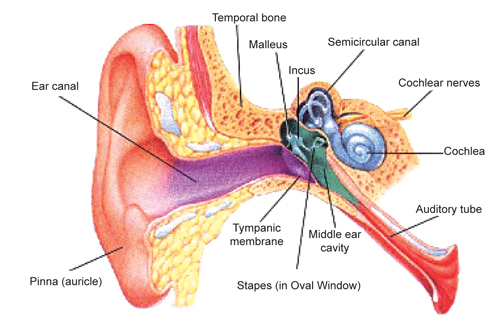How Do Ears Work?
Your ears allow you to hear the world around you. As a dual-purpose organ, they can detect and process sound waves. But how do ears work, exactly?
We’ll answer this question and more, including:
- • Explaining how sound waves are processed in the ear and then relayed to and processed in the brain
- • What the different parts of your ears are
- • What your ears do, including help you maintain your balance
- • How hearing loss occurs
The outermost part of your ear is also the most visible part, and is called the pinna.
The middle of your ear features three tiny bones called ossicles. Each bone is named after its shape:
- The malleus (hammer)
- The incus (anvil)
- The stapes (stirrup)
These three bones are attached to an oval window that connect your middle and inner ear. In addition to your ossicles, your middle ear features hearing or eustachian tubes.
Inside your inner ear is a snail-shaped, fluid-filled organ called the cochlea as well as the vestibular organ.
Your outer, middle, and inner ear work together to help you ear. Here’s how.
1. Your outer ear, or pinna, captures sound waves and amplifies them. When sound waves are detected, they travel down the ear canal to the eardrum. The sound waves cause your eardrum to vibrate, and the vibrations continue to the middle ear.
2. Your middle ear receives the vibrations from your outer ear. From here, your hearing or eustachian tubes:
- . Equalize the pressure between your outer and middle ear
- . Help drain fluids from within your ear
- . Protect your ear from viruses and bacteria
3. The vestibular organ within your inner ear helps maintain your sense of balance. At the same time, the fluid-filled cochlea responds to the vibrations passed through your eustachian tubes. The fluid within the cochlea moves in response and stimulates 25,000 nerve endings.
These nerve endings take these vibrations and transform them into electrical signals. These signals are then sent along the auditory nerve to your brain for interpreting. This explains how sound waves are processed in the ear and then relayed to and processed in the brain. As a result: you can hear.
Pitch is detected by hair cells in the cochlea. High-pitched sounds are detected by hairs near the opening of the cochlea, while lower pitches are detected by hairs in the center.
Volume on the other hand is interpreted by the brain and is measured in decibels. The typical person can hear a range of decibels, most often between 250 and 6,000 hertz.
When your hearing is reduced or lost, many times your ears have sustained damage. For example, exposure to sounds between 2,000 and 5,000 hertz or more can cause hearing sensitivity or damage.
When sound enters your ear, the hair cells on the cochlea are stimulated. When a sound is too loud, these hair cells can bend irreparably. This causes permanent hearing damage which can cause hearing loss.
If any part of your ear is damaged, your brain can’t interpret the electrical signals correctly. In turn, you won’t be able to hear the sounds properly, or at all.
Hearing is not the only factor that may be affected by ear issues. Your ears include your vestibular system, the part of your body that maintain your sense of balance, stability, and spatial awareness. Some common issues that may affect your hearing are:
Ear infections develop due to bacteria or viruses becoming trapped in your middle or inner ear. They are usually treated with antibiotics. Frequent infections can indicate other issues.
Ruptured eardrums can occur for a variety of reasons. Trauma, loud noises, infections, or foreign objects in your ears can cause this hole in the tympanic membrane. While it can heal independently, surgery is sometimes necessary to repair the damage.
Hearing loss can occur for a variety of reasons, but the exact type depends on which part of the ear is affected. Some causes of hearing loss include age, frequent exposure to loud noises, certain medications or medical conditions, and ear wax buildup.
Potential Symptoms of Hearing Issues
If you experience these warning signs, it’s time to consult one of Beltone DFW's hearing care professionals.
- Clogged ears
- Fullness in the ears
- Muffled sounds
- Pain in the ear
- Ringing in the ear (tinnitus)
- Nausea/vomiting
- Feeling unsteady
- Dizziness/lightheadedness
Your ears are an important part of your body. They help you experience and participate in the world around you. The experts at your local Beltone DFW hearing center are here to help you are for and get the most out of your hearing.
If you find yourself struggling with reduced hearing or hearing loss, reach out to your nearest Beltone DFW location. We offer:
- Hearing tests
- Professional fittings for Beltone hearing aids
- And more



